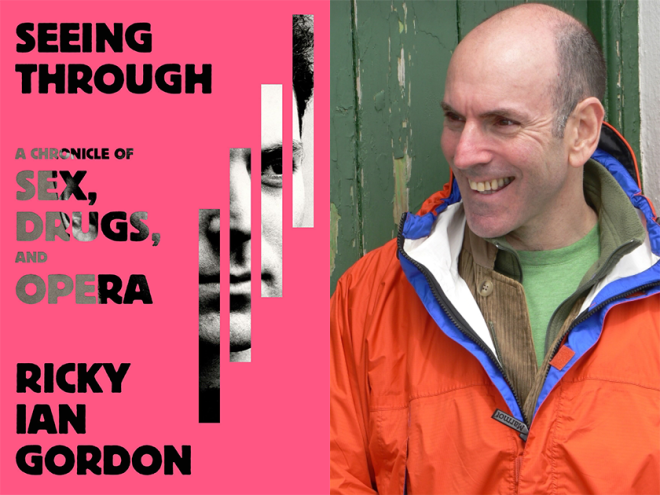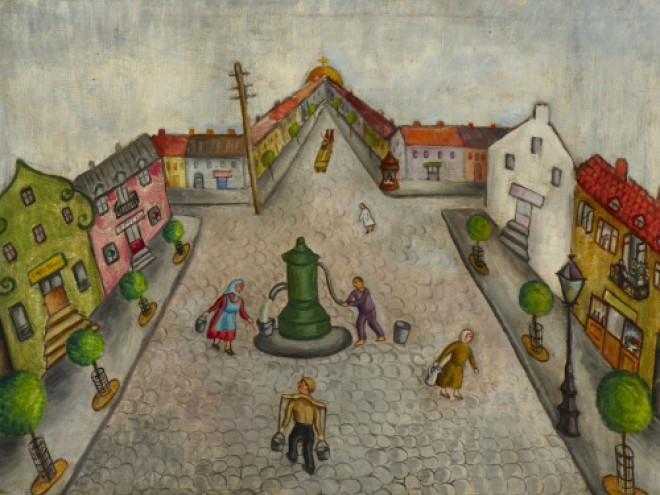
Image found via Pixlr
Playwright David Adjmi’s memoir, Lot Six, was published last June. His plays include Stunning, Marie Antoinette, 3C, Elective Affinities, Strange Attractors, and Caligula. He was interviewed in September by Bob Goldfarb, discussing early influences, societal strictures, and upcoming works.
Bob Goldfarb: You’ve written a memoir with many intimate, personal details about youself. Does that make you self-conscious?
David Adjmi: When I was a teenager I was like a walking Ingmar Bergman film. All I just wanted to do was just rip myself open and get to the nitty-gritty with every single person I met. It’s kind of a relief to lay my cards on the table.
There is a real feeling of relief in sharing your truth with people — and with having them respond. My biggest fear was that my story wasn’t going to be perceived as universal and people would say, “You know, you really are a weird guy.”
BG: That feeling never quite goes away, does it? On some level it keeps coming back, the fear that people will think, “he’s weird.”
DA: I’ve experienced rejection for sharing my stories and my feelings. And I have had that experience of people going, “What?! That’s crazy.” It scars you. You never get over it. Some scars never heal. That’s just how it is.
BG: The loneliness you describe isn’t just about the things that have been done to you — it’s also existential. You were born into certain circumstances. You had the parents you had — the narcissistic mother, the father who was a liar and a con man. Somehow you had to figure out how to live in that world.
DA: Absolutely. That was my orientation to the world: as something disorienting. The orientation and disorientation became fused. I identify with Kafka because of that: life as a dislocating experience. I’ve always deeply felt that. It’s both a gift and a curse.
BG: There are people who aren’t self-aware and go through life not thinking about who they are or what it means. They don’t analyze it, they just live their lives. It must be hard for them to understand you.
DA: It’s not a pathology. I just feel like I’m an extraterrestrial situated here…but I don’t have another home planet. The difference between me and E.T. is that he got to go back to his planet.
BG: In the memoir, it seems you already knew as a child you didn’t fit in. You didn’t know how to find friends, how to be a friend, what to do on a playdate. You had no models for that — like being an extraterrestrial who can’t figure out why people are doing what they do.
DA: Deep inside myself I knew, “I don’t like any of this.” But I was scared of rejecting it, because that was my world — it was all I knew of life.
BG: When you met your childhood friend Howie, you may not have known what was going on, but he was on the same wavelength. He was also an outsider, but he had an active way of dealing with it, by mocking it. Here was someone who seemed to be from your home planet.
DA: He felt very free about sharing with me how he felt, and the freedom of it was intoxicating to me. I never knew who I could express my feelings to, so I didn’t express them. It was only later in my life that I realized that friendships like this are extremely rare, and I was very lucky to have him as a friend. It was like a miracle that I found this person.
BG: He turned out to be gay. Is that a coincidence?
DA: I didn’t know that gay people were a real thing. I thought it was a joke, because that’s what I learned from TV. There’s something about his sensibility that’s a very gay, camp sensibility — more than mine, actually. It definitely had to do with the sensibility that goes with being gay. But it was all very submerged, repressed.
BG: At an early age you were dazzled by the theater. How old were you when you saw Sweeney Todd?
DA: Seven or eight. There was a craze about horror films at that time, and I could not deal with that. But Sweeney Todd was gorgeous — and it was also very funny. Howie’s sensibility encompassed this — that the world is dark and crazy, but it’s also completely hilarious. Toggling hilarity and darkness felt ingenious to me. It’s not horror — it’s really about examining social forces and what they do to people. And it’s really profound when art can do that.
BG: When you write about your life after leaving Brooklyn, it seems that you’re still figuring out whether the blondes and the jocks you meet in Los Angeles are regular people. Then, at Sarah Lawrence College, you’re with another kind of student, the kind who spontaneously quotes Schopenhauer.
DA: I told myself that I was born into a strange enclave, but the world had coherence and a “rightness” which I could eventually apprehend and internalize. Then, I imagined, I would transcend my background, which was a strange accident, and find reality and my place in it. Of course there is no such thing. It was a fantasy. But I held onto it because I thought it would save me. When I realized the world is basically unknowable, that’s when I started to mature as a person.
As I get older it becomes more salient to me that my job is to transform what’s happening to me, or in the world — transform it into art. To take the initiative not to become a victim of my discomfort or pain or social forces, but again and again to insist on circumscribing them into a frame as my subject. That’s what I’m here to do. If I cease to be troubled, I cease to be engaged with my world and my purpose. It doesn’t make me happy or comfortable, but my comfort is not really the point. It’s not why I’m incarnated on this earth, to be comfortable.
If I cease to be troubled, I cease to be engaged with my world and my purpose. It doesn’t make me happy or comfortable, but my comfort is not really the point.
America teaches us to be comfortable, to relax. But beauty is terrible — as in Yeats’ poem, “a terrible beauty is born.” Kant’s notion of the sublime is that it will obliterate you. That register of beauty teaches me about my purpose: to find the sublime, the most poignant, profound things that connect me to my deepest self. That’s what I pursue, and that’s my purpose in the world.
BG: Beauty, or any kind of perfection, exists in relation to the person who experiences it. As an abstraction, in a Platonic existence, it becomes inhuman. Human beings can’t live with perfection; people need purpose. It’s not the attainment of love or beauty or truth that gives life meaning, it’s the pursuit of them.
DA: Beauty exists in tension for me. It’s discomfort that creates an impression of a certain kind of beauty, what Kant called the sublime. That’s what I felt in Sweeney Todd. To me, it’s the most profound experience you can have.
BG: It’s unusual to find a work of prose by a playwright with the extraordinarily rich metaphors and evocative language that you bring to your memoir. Are you thinking of another prose project, perhaps a novel?
DA: I started writing a new book, and I’ll probably finish it. It’s so hard to write long-form prose, at least for me. I have a compulsion to phrase things exactly — which I didn’t know I had, because I don’t do this kind of thing as a playwright. When I finished the memoir I was exhausted and I thought, “This just isn’t worth the trouble.” But then, of course, I started something new right away!
BG: I haven’t seen any of your plays, I’ve only read about them. One thing that struck me, from descriptions I’ve seen, is that several of your plays seem to have strong and/or outlandish women in them. It reminded me of your references to Joan Crawford in the memoir.
DA: I have different archetypes that I draw from. I’m sure so much of it is rooted in my relationship with my mother, a very outsized person. I was very absorbed in her dramas as an observer, and as a sympathetic person. You then mythologize that in your work, unconsciously. So I write about those women, but it’s really diverse. I have a lot of hysterical men in my plays too.
One production that really affected me early on was an O’Neill play at New York Theater Workshop called More Stately Mansions, directed by Ivan van Hove — early, the first thing he did in New York. It was insane! It’s about a man who is completely unstable. His mother wanted to possess him and his wife wanted to possess him, and he has a complete breakdown on stage. That gave me a model, as did Tennessee Williams. I needed to process my own feelings of hysteria and panic and craziness and put my stamp on it as my experience.
My early plays came from a wounded place. With my new play, Stereophonic—which was to go to Broadway in the spring — I feel as though I’m in complete control of my powers as an artist and as a person. It doesn’t have any of my old archetypes and tropes.
I have another play I’ve just finished, called The Stumble, which will be excerpted in the Paris Review in December. It’s about the insane relationship between Oscar Levant and George Gershwin. Levant is more up my alley because he’s a male hysteric who implodes several times during his life. He may have been doing for people what Sweeney Todd did for me — allowing them to access very dangerous feelings and emotions that the culture was perhaps encouraging them to repress. He was a Renaissance man: he’d read everything, he knew everything, he was a postmodern kind of guy before that was the fashion. I just adore him.
Bob Goldfarb is President Emeritus of Jewish Creativity International.



